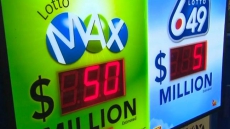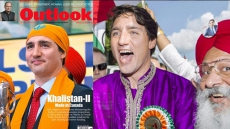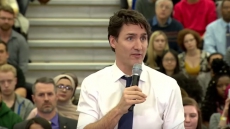TORONTO — A no-harassment policy at a Winnipeg bar featuring amateur and emerging comics likely stirred more Twitter attacks than quelled off-colour show remarks, admits Winnipeg talent booker Tim Gray.
But he says it's also found lots of support from like-minded comedy fans tired of cracks that are more abusive than funny.
Gray says his unusual move to post a list of banned behaviours at Wee Johnny's was meant to address the divisive times we live in, not to limit free speech.
"With the current climate in our society I feel like it's important to make it clear where you stand on anything that comes down to abusive behaviour," says Gray, whose bar hosts regular open-mic nights as well as emerging comics.
"When you have a president in the United States as they do saying what he's saying on Twitter all the time, the whole alt-right movement, all that stuff, I just want to make sure it's completely clear where we stand at Wee Johnny's when it comes to discrimination or hateful speech or abusive behaviour."
Gray crafted a sign last week to warn audiences and comics alike that they could be asked to leave if they engage in "sexism, racism, homophobia, transphobia, physical intimidation or any other form of abusive behaviour."
While most professional clubs are "self-policing," an attempt to ban certain language or subject matter in comedy is nothing new, says Andrew Clark, director of the Humber College comedy writing and performance program in Toronto.
He points to strict codes of conduct during the days of American vaudeville that banned swearing, drinking and sexual material.
Still, comics coming of age today do appear to be more mindful of a myriad of socially sensitive issues dominating headlines.
"Comedy is falling more under the rubric of how theatre and other things have been run, certain kinds of comedy, in that there has to be some kind of social good to it," notes Clark.
"There are so many different factors now going in comedy and I think there's a real belief that comedy has some kind of social engineering function."
There are also a lot more opportunities for diverse voices to speak their truth, thanks to a proliferation of open mic nights and amateur comedy rooms where alternative voices can work out their material.
"Whereas 20 years ago you would have gone to (top-lining Winnipeg comedy club) Rumor's and the lineup would have been fantastic because there really wasn't anywhere for people to go. In Toronto it was the Laugh Resort and Yuk Yuk's.... It was like the Top 40 of Canada," says Clark.
"Now, I've got students who are doing this month (a show called) the 'Ebony Tide,' so it's people of colour every week and then at the end of the month they're doing the 'Ethnic Rainbow' which is all gay people of colour. First time ever. I just think comedy has mirrored everything else in our society."
No Laughing MatterA comedy club in Winnipeg has banned discrimination, hatefulness and harassment of any kind on and off stage. Tim Gray works at Wee Johnny's Comedy Room and joins us with more.
Posted by CTV News Channel on Monday, 5 February 2018
And that's important, says comedy writer and producer Emer O'Toole, who says material that might seem innocuous to one person might actually register as aggressive to another.
Meanwhile, material that touches on difficult topics like rape can be funny and still fall well within the boundaries suggested by Wee Johnny's.
"Sometimes I go to gigs with cisgender heterosexual male friends and we have very different experiences," says O'Toole, part of a feminist humour group at Concordia University that helped produce a comedy show about rape called "Rape is Real and Everywhere."
"I come out saying, 'Wow that was super sexist.' And they're like, 'What sexism?' And it's not that they don't care. It's that we are differently attuned to these things."
That's not to say the mainstream clubs don't make room for different points of view.
Yuk Yuk's founder Mark Breslin notes his national chain has had a monthly all-black comedy show for 20 years, as well as all-female bills. But he created his club to be an "absolute free speech zone."
"There is literally nothing that could be said on stage that I would not allow. Nothing. No matter how vicious, no matter how racist, no matter how sexist, I would still allow it because it is not up to me to censor the act, it's up to the audience to censor the act by not laughing," says Breslin, whose clubs are nevertheless a heckler-free zone.
He can't help but see a ban as something that undermines the very thing that makes comedy such a powerful tool to shift hearts and minds.
Posted by Comedy at Wee Johnny's on Tuesday, 30 January 2018
"Free speech allows people to talk against the government, to make fun of the way that we act towards minorities and all kinds of things. But it also cuts the other way, where we just make fun of those minorities because they're funny. Because people's behaviour is funny."
For O'Toole, the battle is against "a kind of lazy comedy that reinforces oppressive structures." Offensive material is often simply not funny, she says.
"The things that get the biggest laugh are things that are punching up at sexism and racism and able-ism and homophobia and not the stuff that's punching down at queer people and women and people with disabilities," she says.
"Those spaces exist. Are they the mainstream? No, of course they're not the mainstream. I mean turn on any mainstream comedy channel ... and what you're getting is often tired jokes that take their humour from punching down."
Being aware of these things can actually foster more creativity, she says.
"You're not saying, 'Don't joke about these things.' You're saying, 'Put a bit of thought in. Where is the humour coming from?' It's my sincere belief that asking comedians to do that makes better comedy."




